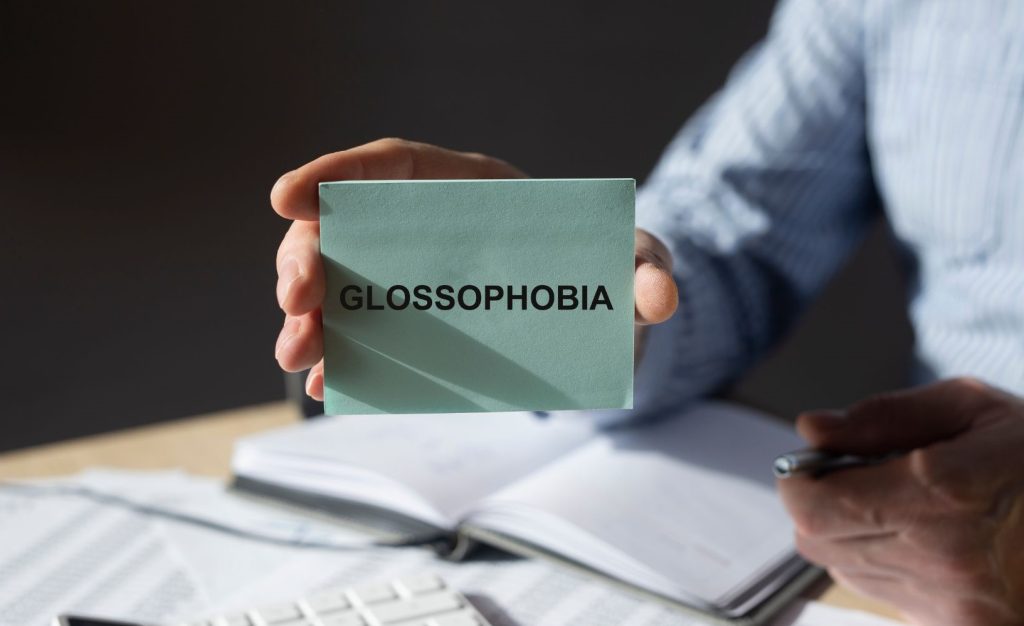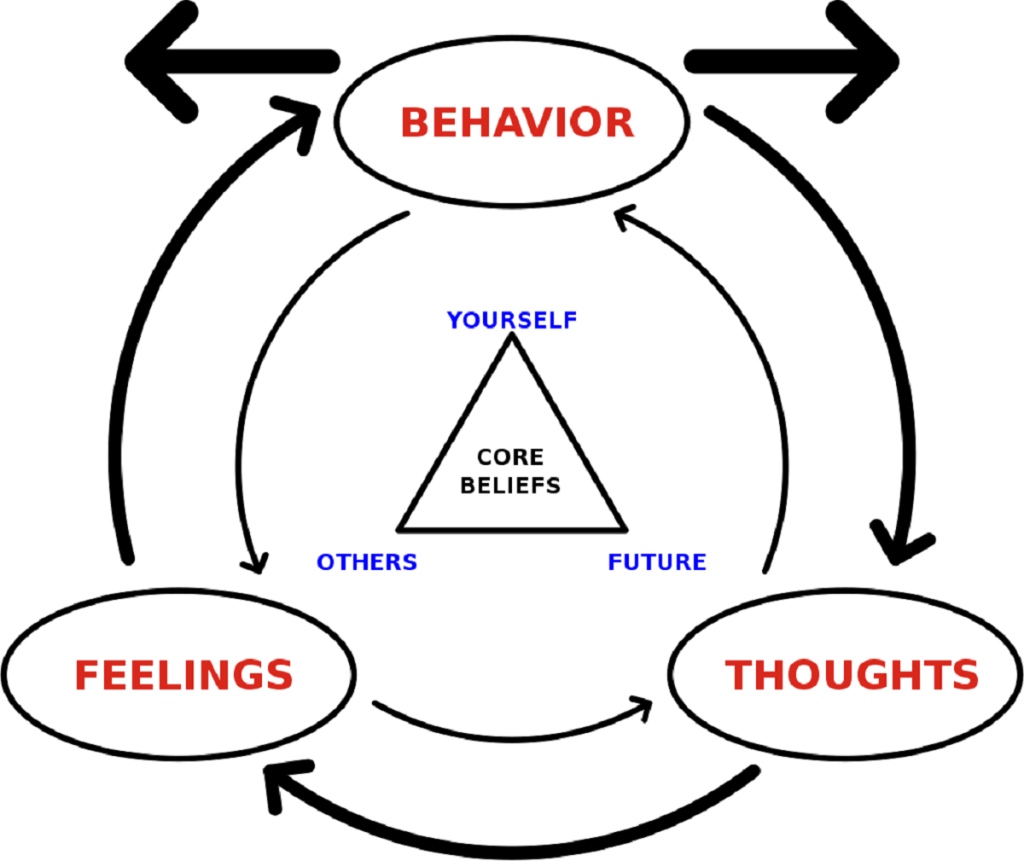Nearly 75% of people experience the social phobia of fear of public speaking. The result may be nervousness before speaking or a full-blown panic attack. Practicing public speaking may lessen the anxiety for some. although others need intervention from a therapist.
Glossophobia can range from mild nervousness to a debilitating phobia that can significantly impact a person’s personal and professional life. It can cause physical symptoms such as sweating, shaking, and increased heart rate, as well as psychological symptoms like negative self-talk, self-doubt, and avoidance of public speaking situations.
Despite the negative impact that fear of public speaking can have on a person’s life, it is a fear that can be overcome with practice, preparation, and support.
This article explores the causes of fear of public speaking, the common symptoms, and effective strategies for overcoming it.
What Is Glossophobia?
Glossophobia is the fear of public speaking, a specific phobia involving an intense and persistent fear of speaking in front of an audience. It is a common fear that affects people of all ages and backgrounds, ranging from mild to severe.
People with glossophobia may experience physical symptoms such as sweating, trembling, rapid heartbeat, dry mouth, or nausea when faced with public speaking. They may also have negative thoughts or beliefs about themselves and their ability to speak effectively, contributing to their anxiety.
Glossophobia can be caused by various factors, including past negative experiences, lack of experience or training, fear of judgment or criticism, and a general fear of being in the spotlight. Fortunately, many effective treatments and strategies help people overcome their fear of public speaking and regain confidence in this important skill.

Is Glossphobia Or Fear Of Public Speaking An Anxiety Or A Mental Illness?
Glossophobia is considered an anxiety disorder rather than a mental illness. Anxiety disorders are characterized by excessive and persistent feelings of fear, worry, and apprehension that interfere with daily life.
While glossophobia can cause significant distress and impairment, it is not typically associated with severe impairment and impairment in functioning related to serious mental illnesses. Glossophobia is a common fear experienced by many people, and it can be treated through various forms of therapy and self-help strategies.
What Are The Symptoms Of Fear Of Public Speaking?
The symptoms of fear of public speaking can vary in intensity and duration, but they typically include physical, emotional, and behavioral symptoms. Physical symptoms may include sweating, trembling, rapid heartbeat, dry mouth, nausea, or dizziness.
Emotional symptoms may include feelings of anxiety, fear, or self-doubt. Behavioral symptoms may include avoidance of public speaking, difficulty concentrating, or impaired communication skills.
These symptoms can be triggered by the anticipation of a public speaking event or during the event itself.

Do People With A Fear Of Public Speaking Have A Problem With Social Anxiety?
People who fear public speaking may also experience social anxiety, as the two conditions can be closely related. Social anxiety disorder is characterized by a persistent fear of social situations, such as meeting new people, being observed or evaluated by others, or speaking in public.
Fear of public speaking can be a specific manifestation of social anxiety, as it involves being the center of attention and being evaluated by others. However, not all people who fear public speaking also have social anxiety, and vice versa.
Treatment for fear of public speaking and social anxiety may overlap, as they share similar underlying causes and symptoms.
What Are Three Causes Of Speech Anxiety?
Speech anxiety, or fear of public speaking, can be caused by various factors, including psychological, situational, and environmental factors.
One common cause of speech anxiety is a lack of experience or training in public speaking, which can lead to feelings of uncertainty and self-doubt. Past negative experiences, such as a poorly received presentation, can also contribute to speech anxiety by creating a fear of failure or embarrassment.
Another factor is a fear of being judged or evaluated by others, which can stem from believing that one’s performance will be inadequate or inferior. Environmental factors, such as a noisy or distracting setting, can also increase anxiety and make it difficult to concentrate during a presentation.

How Do I Get Over My Fear Of Public Speaking?
Despite the prevalence of public speaking anxiety, many individuals still feel afraid before public speaking and may avoid it altogether.
Getting over a fear of public speaking requires effort, time, and practice. Some strategies that may help include desensitization techniques, such as gradually exposing yourself to public speaking situations. In these visualization exercises, you imagine yourself giving a successful presentation and developing positive self-talk to replace negative thoughts.
Building Confidence
Additionally, practicing and rehearsing your presentation can help to build confidence and reduce anxiety. Seeking support from a therapist or public speaking coach can also help develop skills and coping strategies.
Finally, maintaining a healthy lifestyle, including regular exercise, healthy eating habits, and enough sleep, can help reduce anxiety and improve overall well-being.
Social media platforms such as LinkedIn offer opportunities for individuals to practice and improve their public speaking skills in a virtual setting.
Physical Symptoms
Public speaking anxiety, also known as stage fright or public speaking fear, is a common form of social anxiety disorder. It can manifest as a fear of speaking in front of others, experiencing physical symptoms such as a racing heart or elevated blood pressure, and feeling an overwhelming urge to flee.

While public speaking anxiety can be challenging, there are effective ways to manage and overcome it. One technique is to take deep breaths and practice relaxation techniques to ease the fight-or-flight response. Making eye contact with audience members can also help to build connections and reduce anxiety. Joining organizations such as Toastmasters International can provide opportunities to practice public speaking skills in a supportive environment.
Additionally, using tools such as PowerPoint can help organize and convey key points clearly and concisely.
Neuroscience research has also shed light on the underlying brain mechanisms involving public speaking anxiety, providing new insights into effective treatment approaches.
Does Fear Of Public Speaking Go Away?
Fear of public speaking can go away with proper treatment and practice, but it may not completely disappear for everyone. Treatment options such as therapy, medication, and self-help strategies can help manage and reduce speech anxiety symptoms. However, maintaining confidence and ease in public speaking may still require ongoing effort.
Additionally, some individuals may find that their fear of public speaking lessens with age or as they gain more experience and skills.
Are There Any Treatments For Fear Of Public Speaking?
Yes, there are several effective treatments for fear of public speaking. Psychiatry and mental health professionals, such as therapists, can help individuals with speech anxiety by using evidence-based therapies, such as cognitive-behavioral therapy (CBT), to address the underlying beliefs and thought patterns contributing to their fear. During CBT, individuals learn to identify and challenge negative thoughts and ideas that contribute to speech anxiety and develop coping strategies to manage symptoms when they arise.

Exposure therapy, where individuals gradually and repeatedly expose themselves to public speaking situations, can also be helpful. Therapists may also use relaxation techniques, visualization exercises, and other self-help strategies to help individuals manage their anxiety.
Therapists can also provide support, encouragement, and feedback to help individuals build confidence and improve their public speaking skills.

